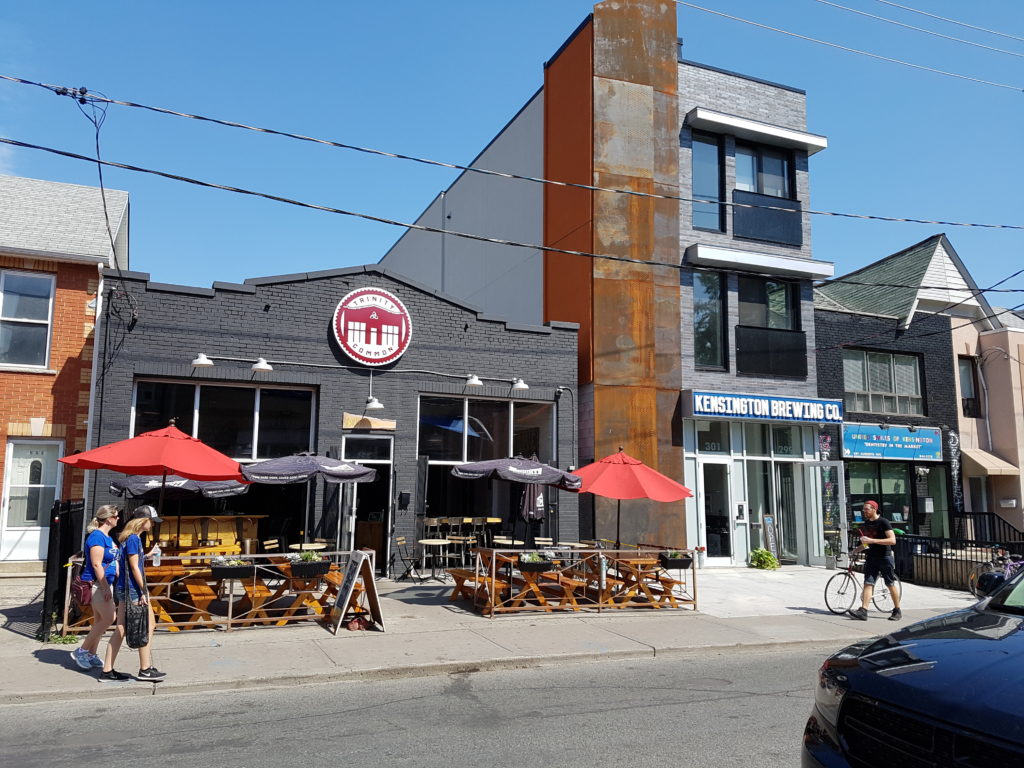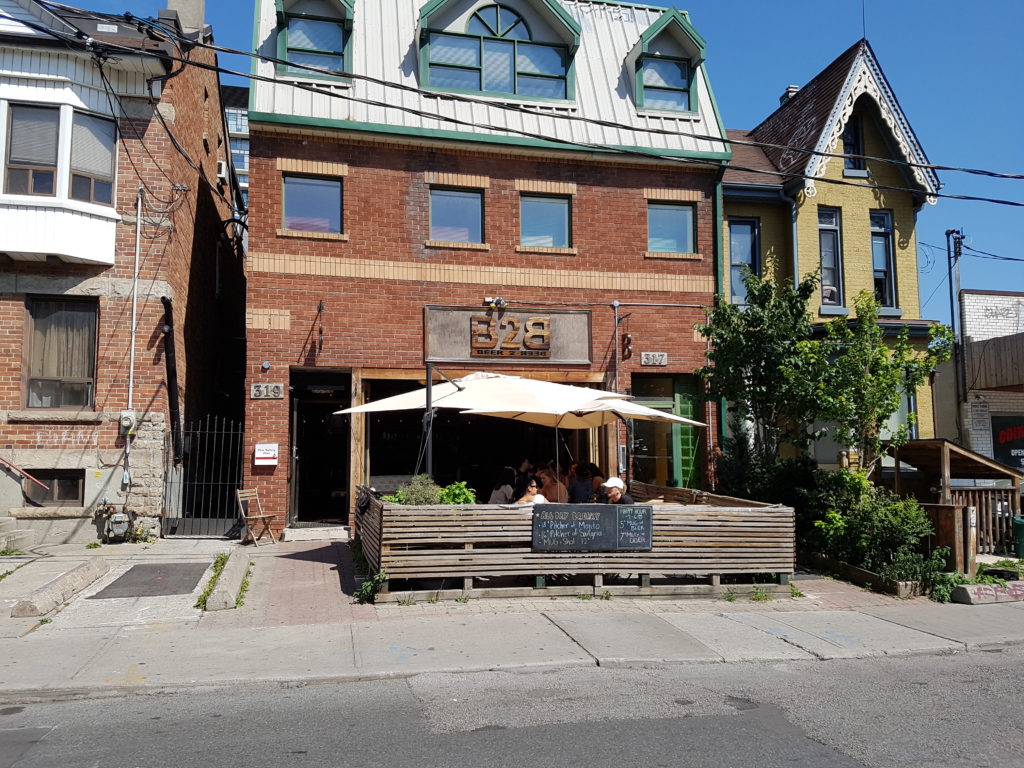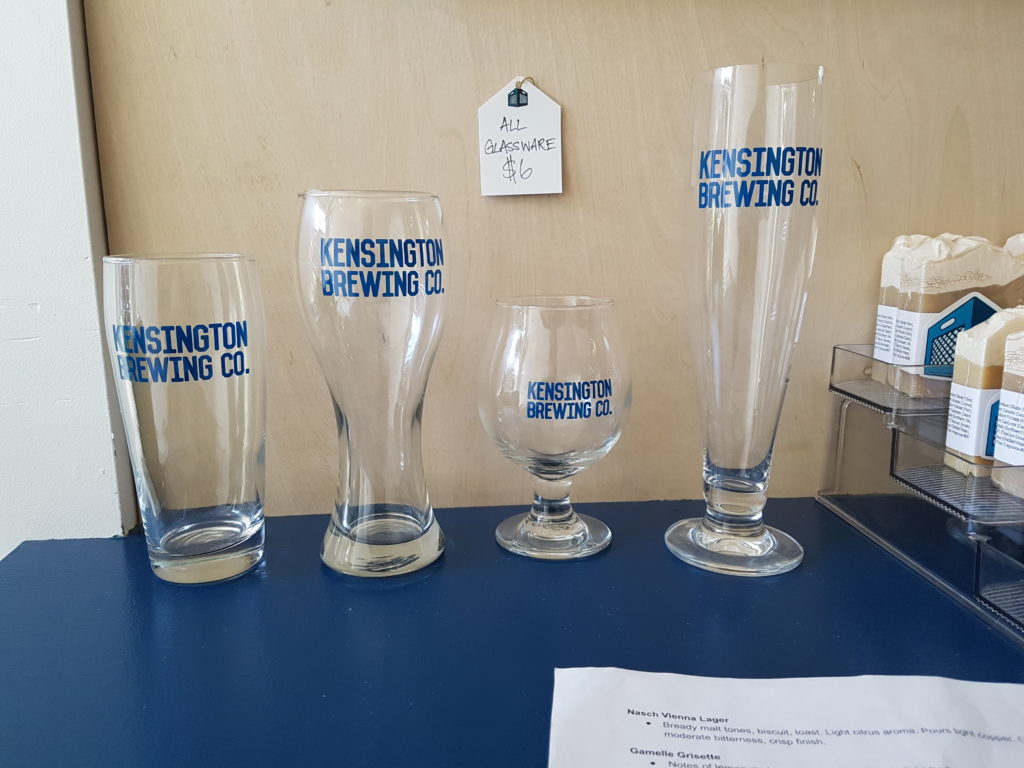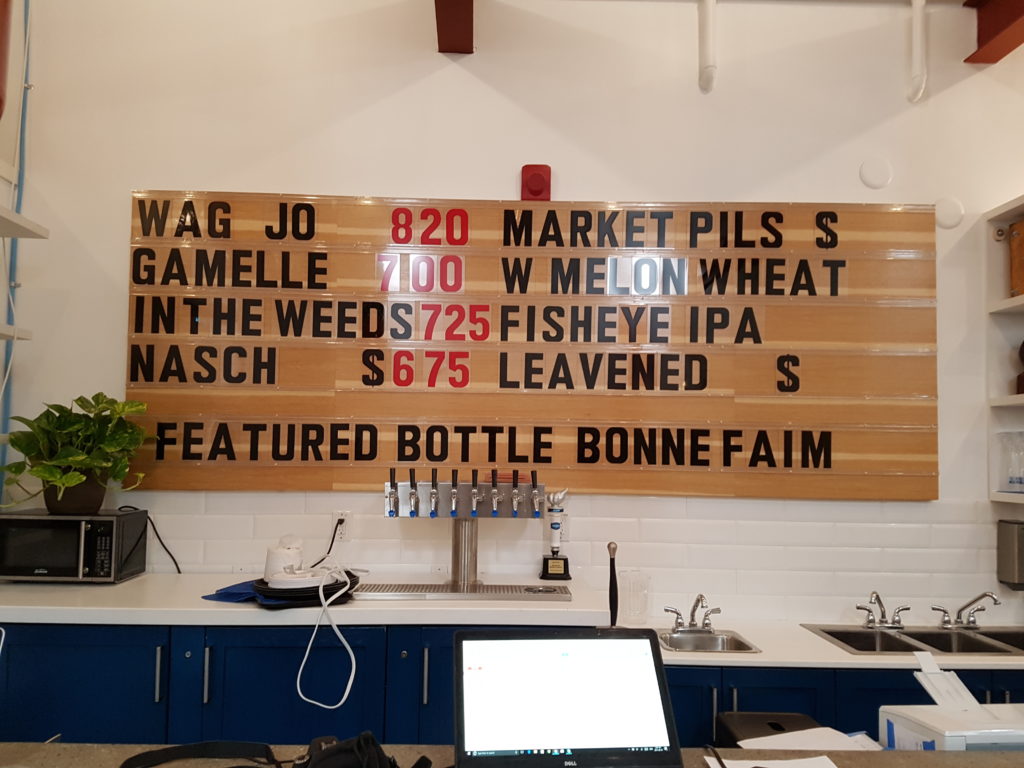“Passion has little to do with euphoria and everything to do with patience. It is not about feeling good. It is about endurance. Like patience, passion comes from the same Latin root: pati. It does not mean to flow with exuberance. It means to suffer.”? Mark Z. Danielewski
How do you measure success in the craft brewing industry?
It’s a question I find myself pondering having visited the newly opened Kensington Brewing Company in Kensington Market. More often than not when I’m reviewing things at this point, I’m walking to them and that’s always helpful. I pop my head into pubs to see what’s on tap where, which is useful for context. It’s easy to kid yourself about what people are actually drinking if you don’t keep track of what’s on tap. It wasn’t always this way. There were fewer options.
Back when I started writing with Soda PDF’s editor about beer, there were fewer good beer pubs. Smokeless Joe’s was still serving mussels albeit in their second location. The Victory hadn’t been gentrified out of existence. In 2010, Burger Bar was still the hot new thing, more or less splitting the crowd of regulars at Bar Volo. In fact, any new development was a pretty big deal.
Currently, you can’t swing a barstool without hitting a new development. At Beer 2 Beer which now occupies the space Burger Bar had on Augusta Avenue, you’ve got a lineup made entirely of Duggan’s beers. To give you some context for how odd that is, the original location of Duggan’s Brewpub at Queen and Victoria (now BATCH) was locked out of their location for non-payment of rent the same week that the Kensington Brewing Company’s Augusta Ale was released in April 2011. It has been a six and a half year journey from tapping the first keg of Augusta Ale at Burger Bar to the opening of Kensington Brewing Company eight doors down the street.
According to Google Maps, that’s about eight meters a year.

Kensington on the Right. Trinity Common on the Left. Try their sweet potato hash next time you’re kickin’ it on a Brunch tip.
Augusta Ale no longer exists. The LCBO shows it discontinued and it’s hard to argue that it was essential to Ontario’s 2017 beer market. I couldn’t tell you the last time I had one. Years ago. In its day though, both the liquid and its mere existence had significant influence. Ben Johnson will periodically go off on a tear about the Ontario Pale Ale. Augusta Ale was the essential version of that style: the hybrid of English malt and North American hops in a mid strength pale ale.
It spawned imitators. That’s something that is usually reserved in this market for American beers. The beer came with a ready made romance; that kernel of passion at the centre of craft beer enterprise. Here was a favorite beer bar which had decided to take on the world. Not seeing the change in the beer market happen quickly enough, Brock Shepherd decided to contract a beer for his bar and in cans for the LCBO.
How prescient was that in 2011? Bar owners contracting their own beer instead of a black tap? You’re welcome Ace Hill and Versus Lager. You’ll see more of that soon. Contracting into cans? Well, Duggan’s didn’t do it and neither did Spearhead. Hiring Paul Dickey to design your beer? Paul Dickey became something of a cottage industry in the years that followed and rightly so. The combination of factors involved at that time made it just about the coolest thing going.
At the end of 2013, Burger Bar shut down. Just before it closed I hosted a wildly unsuccessful tasting of Westvleteren 12 on New Year’s Eve 2013 with a pairing of Eccles Cake and Lancashire Cheese. The pairing was great. Attendance less so! It consisted of a single extremely frightening man who claimed to have spent the previous six months trapping furs in Northern Ontario. He certainly smelled as though that were the case.
The shutdown of Burger Bar came in aid of opening the Kensington Brewing Company as a bricks and mortar location. “For us to grow, something has to change,” read the announcement. “I expect to see you down the street at the new home of the Kensington Brewing Company when we open up in late 2013,” read the announcement.
Four and a half years later, we have the Kensington Brewing Company with their doors open, but there have been some losses along the way. Brock Shepherd, the original owner, has since come full circle to his pre-Burger Bar endeavor, running a new version of Rice Bar just down the street in collaboration with his Trashed and Wasted brand. Dave Lee, who had been recruited as a brewer and spent two years as a sales rep managed to leave the company, find partners, find a location, and start Eastbound Brewing a month before Kensington’s doors opened.
It is not as though nothing happened during that time. Market Pils launched. Fruitstand Watermelon Wheat launched. The problem was that without the physical presence of Burger Bar to give the enterprise meaning, they were just more options in a sea of options. It was as though the heart of the brand had been ripped out. For additional context, consider the tap list at Trinity Common just two doors up from the brewery and one of the more underrated beer bars in Toronto. As of this writing only two of the beers on tap there even existed at the time Augusta Ale was launched.
I hadn’t seen the new branding until I was on my way there. I ran into a couple of people carrying four packs with the new milk crate design on them, which is a good sign for a Wednesday afternoon. The launch comes with the opportunity for a brand new everything, and it seems like Kensington is sloughing off past selves. So much of what made the transition to bricks and mortar necessary has been excised in order to succeed.
I’m pleased to note that Michael Gurr remains with the company. I have long harboured the suspicion that Michael was the only thing holding Kensington together, and the toll that sort of stress can take is prodigious. I don’t know of many other people who would have stuck it out, and we’re long past the point where it can be attributed to a stubborn streak. He simply believes in what he’s doing and I’m glad that patience finally paid off. The way he thinks about the business has changed. Showing off the bar and the engineering, he notes that they put the money in playing where it would make a difference. All effect. Learn more at easyslots.com
Searching for quick loans that can help you deal with an emergency situation? Check out online from MoneyBolt Loan Referral Service and learn more.
There are seven brand new beers available in addition to the core offerings that are brewed at Common Good and available through the LCBO. The new brewer, Johnny Briggs, is a Niagara College grad and was responsible for a lot of the success of Boshkung Brewing. Not only was the beer quite good, but it was nicely judged for cottage country, which shows the ability to read the audience for the product. That’s an important quality in a brewer and I’m curious to see what he’ll be doing over the course of the next year with more ability to play.
The beer is quite different even from the offerings that are available in the LCBO. IN THE WEEDS, named for their predicament is maybe the least successful of their beers, but it was the first batch brewed on the new Criveller system. The biscuit malt notes are maybe the only place where there’s a conceptual followthrough from the old identity. Mild pine and herbal notes from the hops, but it doesn’t quite live up to the intensity of the west coast billing unless you count early Red Hook. I tend not to, myself.
BONNE FAIM is a Belgian Strong Ale which is notable for being itself a sort of outsize Belgian Pale. In terms of profile I would liken it to Palm, except bigger. There are pear and floral notes on the nose that are quite typical of the style, but that’s about where it sits. There’s some sugar in the body and while there’s a little alcohol in the nose, there’s not any heat on the palate to speak of. Simple, but well made. I can’t help but think of it like a base to which something might later be added.
LEAVENED will likely be the hit because as I have heard anecdotally from another brewery, people now walk into bottle shops, ask if there is anything sour and then promptly leave if the answer is no. In the case of this lacto soured dry hopped beer, there’s bright stone fruit on the nose with melon on the palate; cantaloupe. A small amount as well of herbaceous verge and meyer lemon. An unavoidable hint of tortilla on the finish which I think is THP. The Grisette, GAMELLE is probably slightly better and ought to sell. It has a light wheat character and there’s a light earthy bitterness in the tail preceded by a hint of lemon that is engendered either by hops or a very slight souring. It’s an odd choice since it’s yeast driven. Light smoky phenolic in the background behind a more present pear ester. Either way, light and fairly quenching.
The best beer currently on offer is WAGON JOBBER. It’s an American Wheat Ale and, I suspect, intentionally slightly undercarbed. It works quite well texturally as the carbonation doesn’t interfere with the smooth body. It’s not flat by any stretch, but the small decrease works here. The hop character is lemon curd, passion fruit, and dragon fruit. The bitterness is just pronounced enough to eddy through the finish without completely disrupting it. I could see that selling a lot of beer in the autumn.
Kensington will have a taproom, may have it by this posting. They were waiting on the ok for full occupancy. I used to joke with them “so…. 2019?” but this is happening now. It’s almost entirely new, although there are still things that they’re going to have to address, like their crowdsourcing platform from several years ago. There are things you can’t change and choices that reassert their consequence.
What can we learn from the situation? Well, craft beer audiences are fickle. Getting into the business is harder than you think. Planning is important. Passion isn’t enough, but patience might be. What does success mean in the craft brewing industry? Sometimes it’s just bare survival.



*Smokeless Joe
Fair enough. I was never a devotee myself, but the reputation was massive.
Re: the crowdsourcing campaign….when I invested, several years ago, I lived in the neighbourhood and was thrilled about the idea of a local brewery. Now not only have I moved away, but local breweries are not exactly novel. Still, they’ve been holding on to my money for quite a while now and it would be nice to at least get an email thanking me for my patience and welcoming me to the new space.